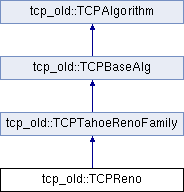#include <TCPReno_old.h>

Public Member Functions | |
| TCPReno () | |
| virtual void | receivedDataAck (uint32 firstSeqAcked) |
| virtual void | receivedDuplicateAck () |
Protected Member Functions | |
| virtual TCPStateVariables * | createStateVariables () |
| virtual void | recalculateSlowStartThreshold () |
| virtual void | processRexmitTimer (TCPEventCode &event) |
Protected Attributes | |
| TCPRenoStateVariables *& | state |
Detailed Description
Implements TCP Reno.
Definition at line 35 of file TCPReno_old.h.
Constructor & Destructor Documentation
| TCPReno::TCPReno | ( | ) |
Ctor
Definition at line 27 of file old/flavours/TCPReno.cc.
: TCPTahoeRenoFamily(), state((TCPRenoStateVariables *&)TCPAlgorithm::state) { }
Member Function Documentation
| virtual TCPStateVariables* tcp_old::TCPReno::createStateVariables | ( | ) | [inline, protected, virtual] |
Create and return a TCPRenoStateVariables object.
Implements tcp_old::TCPAlgorithm.
Definition at line 41 of file TCPReno_old.h.
{
return new TCPRenoStateVariables();
}
| void TCPReno::processRexmitTimer | ( | TCPEventCode & | event | ) | [protected, virtual] |
Redefine what should happen on retransmission
Reimplemented from tcp_old::TCPBaseAlg.
Definition at line 41 of file old/flavours/TCPReno.cc.
{
TCPTahoeRenoFamily::processRexmitTimer(event);
if (event==TCP_E_ABORT)
return;
// begin Slow Start (RFC 2581)
recalculateSlowStartThreshold();
state->snd_cwnd = state->snd_mss;
if (cwndVector) cwndVector->record(state->snd_cwnd);
tcpEV << "Begin Slow Start: resetting cwnd to " << state->snd_cwnd
<< ", ssthresh=" << state->ssthresh << "\n";
state->afterRto = true;
// Reno retransmits all data (unlike Tahoe which transmits only the segment)
// conn->retransmitData();
// After REXMIT timeout TCP Reno should start slow start with snd_cwnd = snd_mss.
// If calling "retransmitData();" there is no rexmit limitation (bytesToSend > snd_cwnd)
// therefore "sendData();" has been modified and is called to rexmit outstanding data.
conn->retransmitOneSegment(true);
}
| void TCPReno::recalculateSlowStartThreshold | ( | ) | [protected, virtual] |
Utility function to recalculate ssthresh
Definition at line 32 of file old/flavours/TCPReno.cc.
Referenced by processRexmitTimer(), and receivedDuplicateAck().
{
// set ssthresh to flight size/2, but at least 2 MSS
// (the formula below practically amounts to ssthresh=cwnd/2 most of the time)
uint flight_size = std::min(state->snd_cwnd, state->snd_wnd);
state->ssthresh = std::max(flight_size/2, 2*state->snd_mss);
if (ssthreshVector) ssthreshVector->record(state->ssthresh);
}
| void TCPReno::receivedDataAck | ( | uint32 | firstSeqAcked | ) | [virtual] |
Redefine what should happen when data got acked, to add congestion window management
Reimplemented from tcp_old::TCPBaseAlg.
Definition at line 64 of file old/flavours/TCPReno.cc.
{
TCPTahoeRenoFamily::receivedDataAck(firstSeqAcked);
if (state->dupacks>=3)
{
//
// Perform Fast Recovery: set cwnd to ssthresh (deflating the window).
//
tcpEV << "Fast Recovery: setting cwnd to ssthresh=" << state->ssthresh << "\n";
state->snd_cwnd = state->ssthresh;
if (cwndVector) cwndVector->record(state->snd_cwnd);
}
else
{
//
// Perform slow start and congestion avoidance.
//
if (state->snd_cwnd < state->ssthresh)
{
tcpEV << "cwnd<=ssthresh: Slow Start: increasing cwnd by one segment, to ";
// perform Slow Start. rfc 2581: "During slow start, a TCP increments cwnd
// by at most SMSS bytes for each ACK received that acknowledges new data."
state->snd_cwnd += state->snd_mss;
// NOTE: we could increase cwnd based on the number of bytes being
// acknowledged by each arriving ACK, rather than by the number of ACKs
// that arrive. This is called "Appropriate Byte Counting" (ABC) and is
// described in rfc 3465. This rfc is experimental and probably not
// implemented in real-life TCPs, hence it's commented out. Also, the ABC
// rfc would require other modifications as well in addition to the
// two lines below.
//
// int bytesAcked = state->snd_una - firstSeqAcked;
// state->snd_cwnd += bytesAcked*state->snd_mss;
if (cwndVector) cwndVector->record(state->snd_cwnd);
tcpEV << "cwnd=" << state->snd_cwnd << "\n";
}
else
{
// perform Congestion Avoidance (rfc 2581)
int incr = state->snd_mss * state->snd_mss / state->snd_cwnd;
if (incr==0)
incr = 1;
state->snd_cwnd += incr;
if (cwndVector) cwndVector->record(state->snd_cwnd);
//
// NOTE: some implementations use extra additive constant mss/8 here
// which is known to be incorrect (rfc 2581 p5)
//
// NOTE 2: rfc 3465 (experimental) "Appropriate Byte Counting" (ABC)
// would require maintaining a bytes_acked variable here which we don't do
//
tcpEV << "cwnd>ssthresh: Congestion Avoidance: increasing cwnd linearly, to " << state->snd_cwnd << "\n";
}
}
// ack and/or cwnd increase may have freed up some room in the window, try sending
sendData();
}
| void TCPReno::receivedDuplicateAck | ( | ) | [virtual] |
Redefine what should happen when dupAck was received, to add congestion window management
Reimplemented from tcp_old::TCPBaseAlg.
Definition at line 130 of file old/flavours/TCPReno.cc.
{
TCPTahoeRenoFamily::receivedDuplicateAck();
if (state->dupacks==3)
{
tcpEV << "Reno on dupAck=3: perform Fast Retransmit, and enter Fast Recovery:";
// enter slow start
// "set cwnd to ssthresh plus 3 times the segment size." (rfc 2001)
recalculateSlowStartThreshold();
state->snd_cwnd = state->ssthresh + 3*state->snd_mss; // 20051129 (1)
if (cwndVector) cwndVector->record(state->snd_cwnd);
tcpEV << "set cwnd=" << state->snd_cwnd << ", ssthresh=" << state->ssthresh << "\n";
// Fast Retransmission: retransmit missing segment without waiting
// for the REXMIT timer to expire
conn->retransmitOneSegment(false);
// Do not restart REXMIT timer.
// Note: Restart of REXMIT timer on retransmission is not part of RFC 2581, however optional in RFC 3517 if sent during recovery.
// Resetting the REXMIT timer is discussed in RFC 2582/3782 (NewReno) and RFC 2988.
}
else if (state->dupacks > 3)
{
//
// Reno: For each additional duplicate ACK received, increment cwnd by MSS.
// This artificially inflates the congestion window in order to reflect the
// additional segment that has left the network
//
state->snd_cwnd += state->snd_mss;
tcpEV << "Reno on dupAck>3: Fast Recovery: inflating cwnd by MSS, new cwnd=" << state->snd_cwnd << "\n";
if (cwndVector) cwndVector->record(state->snd_cwnd);
// cwnd increased, try sending
sendData(); // 20051129 (2)
}
}
Member Data Documentation
TCPRenoStateVariables*& tcp_old::TCPReno::state [protected] |
Reimplemented from tcp_old::TCPTahoeRenoFamily.
Definition at line 38 of file TCPReno_old.h.
Referenced by processRexmitTimer(), recalculateSlowStartThreshold(), receivedDataAck(), and receivedDuplicateAck().
The documentation for this class was generated from the following files:
Generated on Tue Jun 7 2011 14:22:46 for INET Framework for OMNeT++/OMNEST by
 1.7.1
1.7.1